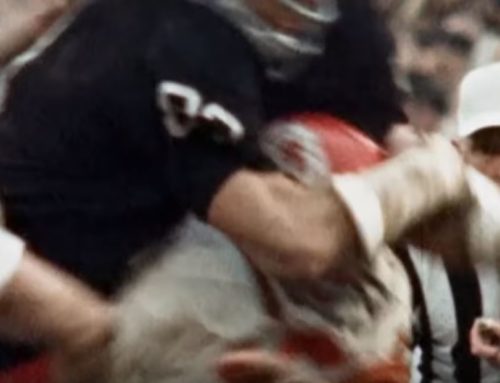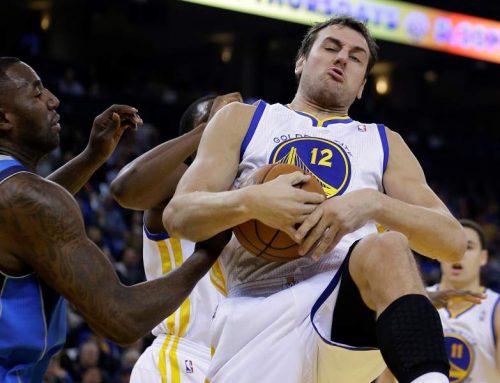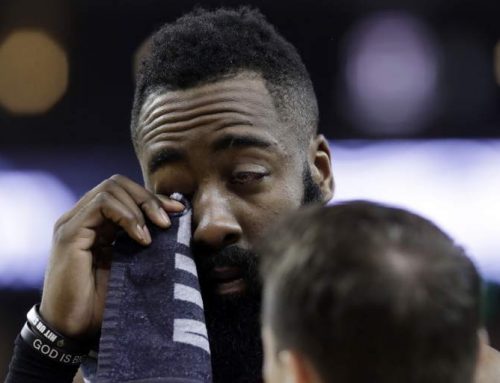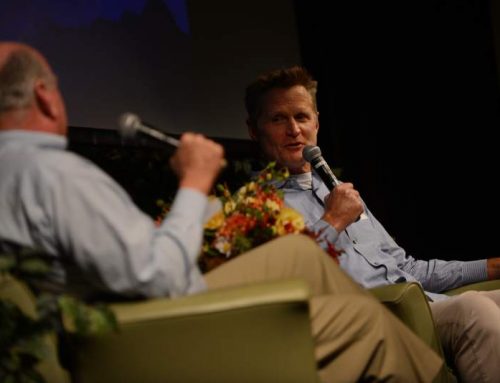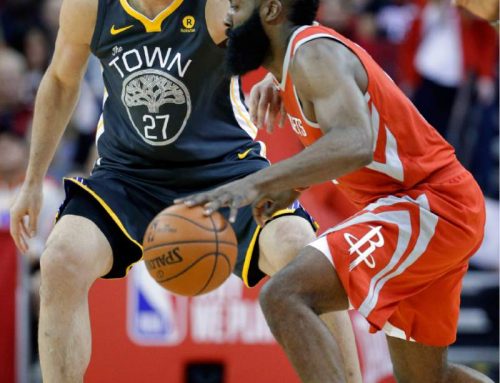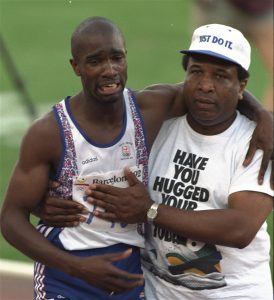
Britain’s Derek Redmond grimaces, as he is helped from the track in Barcelona’s Olympic Stadium Monday, Aug. 3, 1992. Redmond was injured when he fell during the semi-finals of the Men’s 400-meters race during the Summer Olympics Games in Barcelona, . (AP Photo/Denis Paquin)
Every four years I think of Derek Redmond.
Do you know the name? Recall this moment from the 1992 Summer Olympics in Barcelona. It’s a semifinal heat of the men’s 400 meters. The world’s best long-sprinters are in the first straightaway, less than halfway into the race, when a runner crumples. It’s Derek Redmond of England, who has torn his right hamstring. Olympic attendants run to him, but Redmond pushes them away. He begins hobbling toward the turn, a look of anguish on his face.
And then something incredible happens. A larger, older man is pushing his way past race officials, trying to get to Redmond. It’s his father, Jim, and he won’t be denied. He reaches Derek, who throws an arm around his dad’s shoulders. Derek Redmond is sobbing now as realization sinks in. But together they continue, father and son, until they reach the finish line.
Working as a sportswriter sometimes feels like being a professional cynic. We’re discouraged from getting too close to our subjects. We’re not supposed to root. But every time I watch Jim and Derek Redmond making their way down that track in Barcelona, I melt. There is so much human drama funneled into this one moment: the heartbreak of athletic failure; the grim determination of a fallen champion; a father’s love for a child in need.
No, you’re getting weepy at your computer.
So with the track and field events heating up in Rio, I decided to watch a replay of the Derek Redmond race. I did what any experienced journalist would do: I Googled “Derek Redmond Barcelona 1992” and went to the Videos section. And then things got strange.
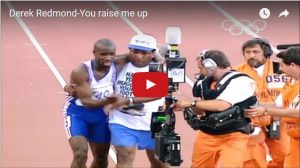
One of many videos of Jim Redmond (center) helping his son Derek reach the finish line during the 1992 Summer Olympics.
I didn’t want an edited version. I just wanted to see the race to its conclusion. So I clicked again. Result No. 2 wasn’t the race itself but a poor-quality clip from a documentary about Redmond’s effort. No good. No. 3 was accompanied by the song “You Raise Me Up” by Josh Groban, and by overwrought pages of text: “A young man was favored to win the 400-meter race in the Barcelona Summer Olympics…”
No. 4 hit me with another song, the melodramatic “Arms Wide Open” by Creed. The footage was from Japanese TV. The video ended with a bible verse.
No. 5 included Morgan Freeman narration. No, I swear to God. Morgan Freeman intoning: “Derek Redmond didn’t finish in first place in the 1992 400 meter. He didn’t finish in second. Or third. Or fourth. He, and his father, finished dead last.” I was then treated to a song identified as “Lowkey” by My Soul.
No. 6 was part of a British broadcast that was clearly a compilation of the “best of” athletic moments. “At No. 28,” it began, “an Olympic image that, if you watched it at the time – Barcelona, 1992 – will live with you forever.” Did anyone else find it bizarre that the original footage was so hard to find? I scrolled through the comments below the video. Most of them were affirmative, but one said, “Finally, the video without that stupid creed song playing over it.” Another asked, “why the cheesy (bleepin) music? where can I see the original video?”
It was a great question. By now I was determined to find that video. I didn’t want violins or piano accompaniment to my 400-meter race. I didn’t want inspirational messages. I just wanted to see Derek and Jim Redmond in their melancholy embrace.
But No. 7 directed me to interviews on godtube.com, No. 8 was that same documentary (“At No. 28…”), and I recognized No. 9 as the same production as No. 3, only with floating numbers that formed “1992.” No. 10 was overlaid with a Coldplay song. Perfect. At the 2:15 mark, Jim Redmond came to Derek’s aid and a graphic read: “I’m here, Son.”
On and on it went. I began to see details I hadn’t noticed before. Like the fabulous kelly-green pants the Barcelona volunteers wore. Like Jim Redmond’s all-Nike attire, including cap (JUST DO IT) and T-shirt (HAVE YOU HUGGED YOUR FOOT TODAY?).
I abandoned Google and tried searching on YouTube. I came across versions in French (“La course de Derek Redmond”), German (“Vater-Sohn Derek Redmond 1992”) and Spanish (“Derek Redmond: Nunca Corres Solo – Alcanza Tu meta”). That last phrase translates to “Derek Redmond: Never Run Alone – Reach Your Goal.” The Creed song was in English.
Some of the videos were preceded by ads, so on my spiritual quest I got to see commercials for Krave jerky and NatureMade gummy vitamins, for Mazda and a web development platform called Wix. In one video, Derek and Jim Redmond were themselves converted into an ad for Visa.
I narrowed my search. As I typed the sprinter’s name into the YouTube search field, one of the options that popped up was: “derek Redmond 1992 olympics original footage no music.” Aha! My Moby-Dick! But it was a sham. I clicked on the first entry and that British announcer once again began, “At No. 28…”
Another offering caught my eye. It was labeled “1992 Olympics 400m Semifinal 1, Barcelona, Spain.” This pared-down description was encouraging. So was the thumbnail photo, which wasn’t a portrait of the crying Derek Redmond, but rather a bird’s-eye shot of several men crossing a finish line.
Indeed, this was the closest I came to satisfaction. “1992 Olympics 400m Semifinal 1, Barcelona, Spain” was indeed a simple video of the race. The commentary was by Australians Bruce McAvaney and John Walker. They call it like a horse race, and at the moment of the injury one of them says, “Oh, Redmond’s fallen. He’s out of it. Shocking luck.”
The video shows the race in its entirety. Steve Lewis wins it; he will go on to finish second to fellow American Quincy Watts in the 400-meter final. The only problem with the footage is that there isn’t enough of it. After Lewis’ win, we get only the briefest glance back at the fallen Redmond before the movie ends.
Somewhere out there, I’m sure, is the film I’m looking for. But the fact that it’s so arduous to track down isn’t merely annoying. It’s deeply depressing.
What the hell is wrong with our global culture? Derek Redmond’s limp toward the finish line in Barcelona is one of the most powerful images in the history of modern sport. It is, in fact, close to perfect. Please let us watch it, without mediation. Let it wash over us, inspire us or tug at our hearts or shame us with its truths. This should be obvious, YouTubers of the world, but you are not enhancing the experience with your cheesy music, silent-movie-style title pages and bible verses. Some would say you are ruining it.
There was another amazing Olympic moment Tuesday in Rio, when runners Abbey D’Agostino of the U.S. and Nikki Hamblin of New Zealand made contact and hit the deck in the women’s 5,000 meters. D’Agostino (who, as it turned out, was seriously injured), encouraged Hamblin to get up, and they helped one another toward the finish line, then hugged after crossing. Strangely familiar, right?
Well, get a good look at the heroics of D’Agostino and Hamblin while you can. In a few years, their race will be nothing more than a Visa ad.

